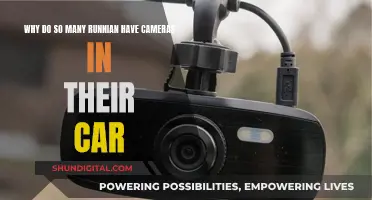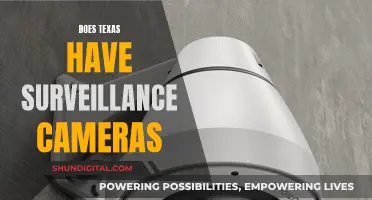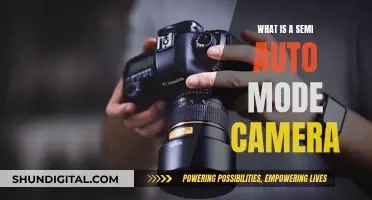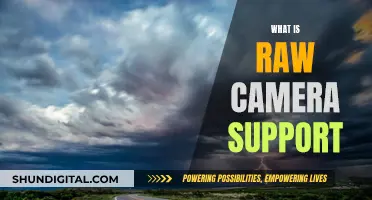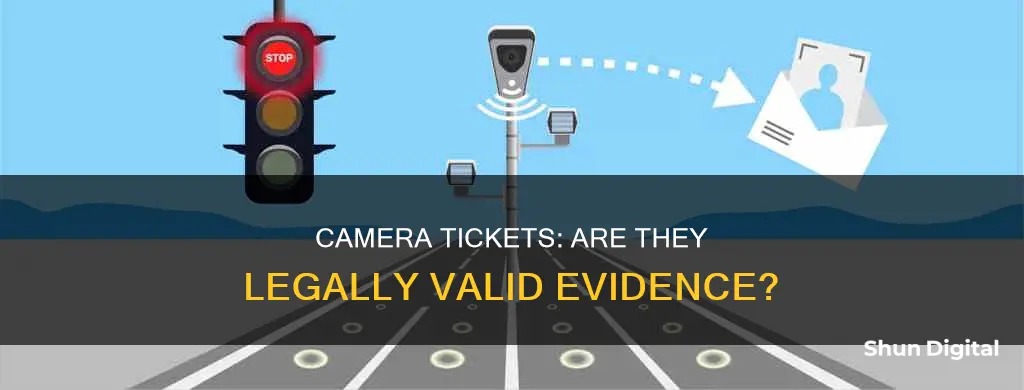
Camera tickets are issued for a variety of traffic violations, including speeding, running red lights, and passing a stopped school bus. They are becoming more common, and many drivers wonder if they are valid and enforceable. In some states, such as Washington, camera tickets are entirely legal and treated similarly to parking tickets, with no impact on driving records or insurance rates. However, in other states, the laws vary, and drivers may have several options for responding to a camera ticket, including paying the fine, disputing the ticket, or ignoring it. Understanding the laws and options in your specific state is crucial for handling camera tickets effectively.
| Characteristics | Values |
|---|---|
| Legality | Legal in Florida, Colorado, and Washington State |
| Enforceability | Enforceable in Florida and Washington State |
| Driving Record Impact | No impact on driving record in Washington State |
| Insurance Rate Impact | No impact on insurance rates in Washington State |
| Non-Payment Consequence | Unable to renew vehicle registration in Washington State |
| Contestability | Contestable in Colorado and Washington State |
| Mitigability | Mitigable in Washington State, except for school zone violations |
| Declaration of Non-Responsibility | Allowed in Washington State |
What You'll Learn
- Camera tickets are legal in some states, such as Washington and Florida, but not others
- They are treated like parking tickets and don't go on your driving record
- You can fight a camera ticket by requesting a contested hearing and checking the video
- If you don't pay, you may not be able to renew your vehicle registration
- You can also ask for a mitigation hearing to explain your reason for the violation

Camera tickets are legal in some states, such as Washington and Florida, but not others
The use of camera tickets is a divisive issue in the US. While some states, such as Washington and Florida, consider them legal, others do not. Camera tickets are issued for various traffic violations, including speeding, running red lights, or passing a stopped school bus. While you have the option to pay the fine by mail and avoid the hassle of a court appearance, it's important to know your rights and the specific laws in your state.
In Washington, camera tickets are entirely legal, according to the Washington State Legislature. These tickets are commonly used in regions to enforce traffic laws at stoplights and railroad crossing zones. To ensure fairness, areas using cameras for ticketing must display a notice or sign visible to the public. Camera tickets in Washington are treated similarly to parking tickets, so they won't go on your driving record or affect insurance rates. However, failure to pay the fine will result in consequences during vehicle registration renewal. Drivers in Washington have the right to contest camera tickets and request a hearing, especially if they can prove they weren't the individuals driving.
Florida also recognizes the legality of camera tickets, specifically for red-light violations. As of June 30, 2021, the state had 485 active red-light cameras, resulting in over 1 million notices of violation in FY 2021-2022. Florida law allows for contesting these tickets in court or enrolling in a driver improvement course to reduce the citation fee.
On the other hand, the use of camera tickets is a controversial topic in states like Colorado. While camera tickets are currently legal, there has been a push to ban them through bipartisan bills. Opponents of camera tickets argue that they are more about increasing city revenue than enforcing safety. The controversy arises from the varying ways municipalities handle these tickets, leading to confusion among drivers. Additionally, Colorado state law has unique requirements, such as a 90-day limit for serving violation notices and restrictions on valid tickets to those driving 25 mph or less.
The legality of camera tickets varies across the US, and it's essential to understand the specific laws and regulations in your state. While some states embrace their use for traffic enforcement, others question their effectiveness and fairness. As a driver, staying informed about your rights and the applicable laws in your region is crucial to navigate these situations effectively.
Numbering Images in Camera Raw: A Beginner's Guide
You may want to see also

They are treated like parking tickets and don't go on your driving record
Camera tickets are increasingly common, and many drivers wonder how to handle them. These tickets are typically issued for running red lights, speeding, or passing a stopped school bus. While some people pay the fine by mail to avoid the hassle of a court case, others claim the tickets are illegitimate.
Camera tickets are treated like parking tickets in some places, such as Washington State. This means they don't go on your driving record and won't impact your insurance rates. However, you still need to pay the fine. If you don't, you may face consequences like being unable to renew your vehicle's registration.
In some places, you can fight a camera ticket in court. For example, in Washington State, you can request a contested hearing and check the video affiliated with your infraction. If you weren't driving, you can also file a declaration of non-responsibility. However, in most cases, you won't need to hire an attorney since the ticket won't go on your driving record.
The process for handling camera tickets can vary by location. For instance, in Denver and Aurora, the locations of the cameras and schedules for speed vans are publicly listed. Knowing this information can help drivers be more careful and avoid tickets. On the other hand, each municipality may have its own code for handling citations by mail, which can lead to confusion.
Zumimall Camera Charging: How to Know It's Charging?
You may want to see also

You can fight a camera ticket by requesting a contested hearing and checking the video
Camera tickets are typically processed like parking tickets and will not appear on your state driving record. However, they can be frustrating and expensive, and you may want to fight a camera ticket if you believe it was issued unfairly. The process for doing so may seem intimidating, but understanding the necessary steps can improve your chances of successfully contesting the ticket.
The first step is to carefully review all the information provided on the ticket. Check for accuracy in the date, time, location, and the alleged violation. Make sure that any images or video evidence clearly show the violation and accurately identify your vehicle. Note that camera tickets are usually mailed to the vehicle's registered owner, so if you were not the driver at the time of the incident, you may need to identify the actual driver during the appeal process.
Before contesting the ticket, research the specific camera laws and regulations in your area. Familiarize yourself with the legal requirements and potential penalties for the violation. This knowledge will help you build a solid defense for your case. Gather any evidence that supports your claim of innocence, such as photographs, video footage, eyewitness statements, or technical issues with the camera.
If you discover any issues with the camera's maintenance or calibration records, you can use this as evidence to contest the ticket. Draft a formal appeal letter, addressing it to the appropriate authority responsible for handling camera tickets in your area. Be concise, factual, and respectful in your appeal. Clearly explain why you believe the ticket is unjust and present your evidence to support your case.
To fight a camera ticket, you can request a contested hearing. This may involve appearing at an arraignment or first appearance and pleading not guilty. Demand a full formal hearing or trial, and be prepared to attend other hearings such as pre-trial hearings or mediation. Request the production of documents, such as maintenance records for the camera and any relevant traffic light or speed monitoring systems, to establish that they were regularly monitored and maintained.
During the hearing, listen quietly while the prosecutor presents their case. You can then present your defense, challenging the admissibility of any photographs as hearsay or asserting your right to confront witnesses. Dispute the authenticity of the photographs if no one from the company that maintains the camera shows up to testify. Attack the lack of evidence if the photos are clear but do not show you driving or do not prove that the traffic light or speed detection system was functioning properly.
Keep in mind that the specific steps and requirements for fighting a camera ticket may vary depending on your location, so it is important to research the applicable laws and procedures in your area.
Unlocking RAW Image Potential: Editable Features Explained
You may want to see also

If you don't pay, you may not be able to renew your vehicle registration
Traffic camera tickets are becoming more common, and many people question their validity. These tickets are usually issued for running red lights or speeding, and while most people pay them, others claim they are illegitimate.
If you receive a traffic camera ticket, you have several options. You can pay the fine, fight the ticket, or ignore it. If you choose to ignore a ticket, there may be consequences. One possible consequence is the inability to renew your vehicle registration.
In California, for example, if a parking ticket goes unpaid for over 90 days, the issuing agency may report the fine to a collection agency and the DMV. The DMV will then put a "hold" on your registration renewal, meaning you won't be able to renew your vehicle's registration until you pay the outstanding parking tickets. Similarly, in Ontario, Canada, failure to pay a red light camera ticket could result in the vehicle owner's inability to renew their vehicle registration.
It's important to note that the consequences of ignoring a traffic camera ticket may vary depending on your location. While some places may allow you to renew your registration with unpaid tickets, others may impose stricter penalties. It's always best to check with your local authorities or seek legal advice to understand the specific rules and regulations that apply in your area.
The Ultimate Guide to Installing Camera Mods
You may want to see also

You can also ask for a mitigation hearing to explain your reason for the violation
If you've received a camera ticket, you may be wondering what to do about it. While most people pay them, many claim they are illegitimate. So, what are your options?
Firstly, you can pay the fine and be done with it. If you decide to go down this route, nothing is reported to the DMV as you don't get traffic infraction points for camera-ticketed violations.
Secondly, you can choose to fight the ticket. This may involve disputing who is pictured driving or the clarity of that picture. For example, you could show that you weren't the driver in the photo and provide evidence that it was a similar-looking sibling.
Finally, you can ask for a mitigation hearing to explain the circumstances of the violation and request a reduction in the ticket fine. It's important to note that, at a mitigation hearing, you won't have the chance to dispute the charges of the traffic citation. Instead, you'll be admitting that you committed the infraction, but providing context for why it happened. The judge may or may not choose to reduce your fine, and the infraction will still appear on your driving record.
A mitigation hearing may be a good option if you have a non-moving violation, such as an expired registration or no insurance. In these cases, a mitigation hearing could result in a significant reduction in your fine, without affecting your insurance rates. However, if you have a moving violation, such as a speeding ticket, mitigation is probably not the best option. The small amount of money you might save on the fine is unlikely to make up for any increases in insurance or employment problems.
Panasonic Lumix DMC-LX10K: Battery Life Explained
You may want to see also
Frequently asked questions
Camera tickets are valid in some states, such as Washington and Florida, but the laws vary from state to state. It's important to check the specific laws in your state or the state where you received the ticket.
Camera tickets are typically issued for running red lights, speeding, or passing a stopped school bus. These tickets are a type of automated enforcement technology used to detect and prevent these traffic violations.
You have a few options when you receive a camera ticket. You can pay the fine by sending a check in the mail, fight the ticket in court, or ignore it. Paying the fine is often the simplest option to avoid the hassle of going to court. However, if you believe you have a valid reason to dispute the ticket, you can choose to fight it. Ignoring the ticket may result in additional consequences, such as the inability to renew your vehicle's registration.
In some states, camera tickets are treated similarly to parking tickets and do not go on your driving record. For example, in Washington State, camera tickets do not impact your driving record or insurance rates. However, it's important to check the specific laws in your state, as this may vary.
There are a few ways to check if you have received a camera ticket. You can check your driver's license online through a website provided by the DMV, call your local courthouse, or contact the company that processes traffic violations in your area, such as American Traffic Solutions (ATS) in Florida.




